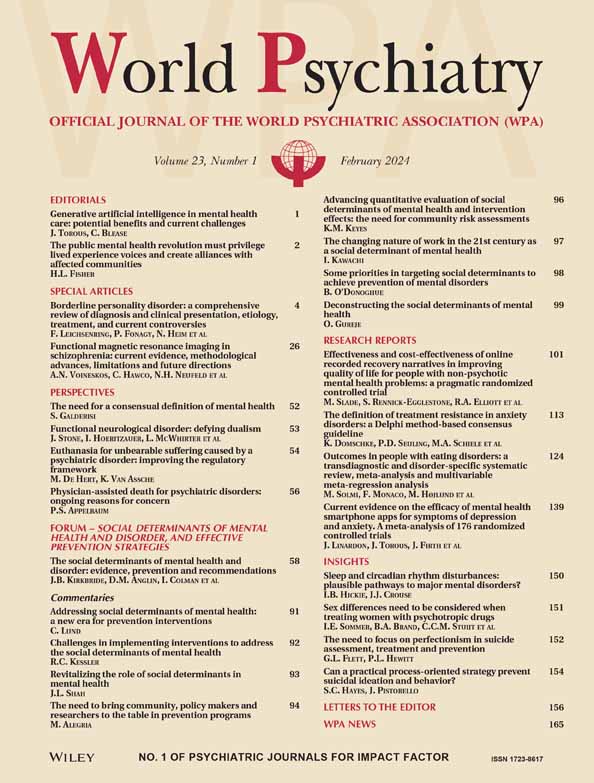Oral and long‐acting antipsychotics for relapse prevention in schizophrenia‐spectrum disorders: a network meta‐analysis of 92 randomized trials including 22,645 participants
IF 65.8
1区 医学
Q1 PSYCHIATRY
引用次数: 33
Abstract
According to current evidence and guidelines, continued antipsychotic treatment is key for preventing relapse in people with schizophrenia‐spectrum disorders, but evidence‐based recommendations for the choice of the individual antipsychotic for maintenance treatment are lacking. Although oral antipsychotics are often prescribed first line for practical reasons, long‐acting injectable antipsychotics (LAIs) are a valuable resource to tackle adherence issues since the earliest phase of disease. Medline, EMBASE, PsycINFO, CENTRAL and CINAHL databases and online registers were searched to identify randomized controlled trials comparing LAIs or oral antipsychotics head‐to‐head or against placebo, published until June 2021. Relative risks and standardized mean differences were pooled using random‐effects pairwise and network meta‐analysis. The primary outcomes were relapse and dropout due to adverse events. We used the Cochrane Risk of Bias tool to assess study quality, and the CINeMA approach to assess the confidence of pooled estimates. Of 100 eligible trials, 92 (N=22,645) provided usable data for meta‐analyses. Regarding relapse prevention, the vast majority of the 31 included treatments outperformed placebo. Compared to placebo, “high” confidence in the results was found for (in descending order of effect magnitude) amisulpride‐oral (OS), olanzapine‐OS, aripiprazole‐LAI, olanzapine‐LAI, aripiprazole‐OS, paliperidone‐OS, and ziprasidone‐OS. “Moderate” confidence in the results was found for paliperidone‐LAI 1‐monthly, iloperidone‐OS, fluphenazine‐OS, brexpiprazole‐OS, paliperidone‐LAI 1‐monthly, asenapine‐OS, haloperidol‐OS, quetiapine‐OS, cariprazine‐OS, and lurasidone‐OS. Regarding tolerability, none of the antipsychotics was significantly worse than placebo, but confidence was poor, with only aripiprazole (both LAI and OS) showing “moderate” confidence levels. Based on these findings, olanzapine, aripiprazole and paliperidone are the best choices for the maintenance treatment of schizophrenia‐spectrum disorders, considering that both LAI and oral formulations of these antipsychotics are among the best‐performing treatments and have the highest confidence of evidence for relapse prevention. This finding is of particular relevance for low‐ and middle‐income countries and constrained‐resource settings, where few medications may be selected. Results from this network meta‐analysis can inform clinical guidelines and national and international drug regulation policies.口服和长效抗精神病药物预防精神分裂症谱系障碍复发:92项随机试验的网络荟萃分析,包括22645名参与者
根据目前的证据和指南,持续的抗精神病药物治疗是预防精神分裂症谱系障碍患者复发的关键,但缺乏基于证据的关于选择个体抗精神病药进行维持治疗的建议。尽管出于实际原因,口服抗精神病药物通常是一线处方,但长效注射抗精神病药(LAI)是解决疾病早期依从性问题的宝贵资源。检索Medline、EMBASE、PsycINFO、CENTRAL和CINAHL数据库和在线注册,以确定将LAI或口服抗精神病药物与安慰剂进行正面或正面比较的随机对照试验,该试验于2021年6月发布。使用随机效应配对和网络荟萃分析将相对风险和标准化平均差异汇总。主要结果是复发和因不良事件而辍学。我们使用Cochrane偏倚风险工具来评估研究质量,并使用CINeMA方法来评估合并估计的置信度。在100项符合条件的试验中,92项(N=22645)为荟萃分析提供了可用数据。在预防复发方面,纳入的31种治疗中,绝大多数都优于安慰剂。与安慰剂相比,口服氨磺酰亚胺(OS)、奥氮平、阿立哌唑-LAI、奥氮平-LAI、阿立哌唑-OS、帕利培酮-OS和齐拉西酮-OS的结果置信度“较高”。帕利哌酮-LAI每月1次、伊洛哌酮-OS、氟奋乃嗪-OS、布瑞哌唑-OS、帕利哌醇-LAI每月一次、阿塞那平-OS、氟哌啶醇-OS、喹硫平-OS,卡哌嗪-OS和鲁拉西酮-OS对结果的置信度为“中等”。就耐受性而言,没有一种抗精神病药物比安慰剂明显差,但置信度较差,只有阿立哌唑(LAI和OS)显示出“中等”置信水平。基于这些发现,奥氮平、阿立哌唑和帕利培酮是维持治疗精神分裂症谱系障碍的最佳选择,因为这些抗精神病药物的LAI和口服制剂都是最好的治疗方法,并且对预防复发的证据有最高的信心。这一发现与低收入和中等收入国家以及资源有限的环境特别相关,因为这些国家可能很少选择药物。该网络荟萃分析的结果可以为临床指南以及国家和国际药品监管政策提供信息。
本文章由计算机程序翻译,如有差异,请以英文原文为准。
求助全文
约1分钟内获得全文
求助全文
来源期刊

World Psychiatry
医学-精神病学
自引率
7.40%
发文量
124
期刊介绍:
World Psychiatry is the official journal of the World Psychiatric Association. It is published in three issues per year.
The journal is sent free of charge to psychiatrists whose names and addresses are provided by WPA member societies and sections.
World Psychiatry is also freely accessible on Wiley Online Library and PubMed Central.
The main aim of World Psychiatry is to disseminate information on significant clinical, service, and research developments in the mental health field.
The journal aims to use a language that can be understood by the majority of mental health professionals worldwide.
 求助内容:
求助内容: 应助结果提醒方式:
应助结果提醒方式:


